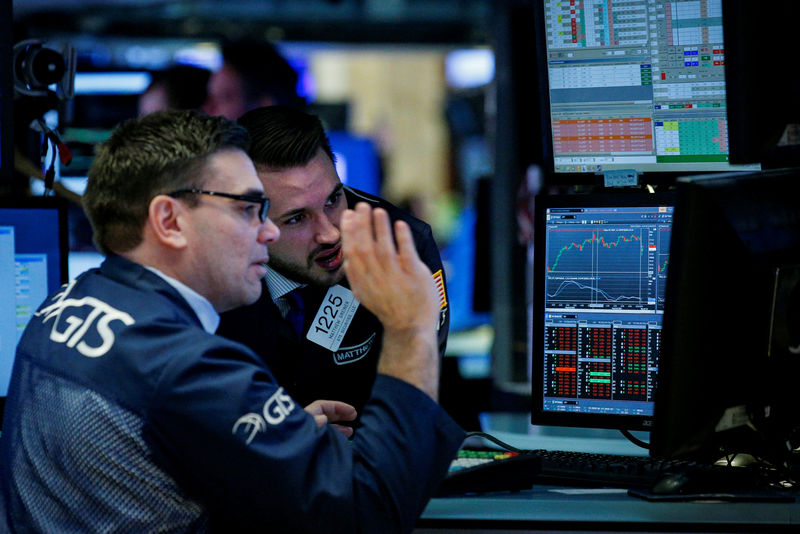LONDON (Reuters) - Following are five big themes likely to dominate the thinking of investors and traders in the coming week, and the Reuters stories related to them.
1/THE POWER OF EARNINGS
The earnings season that kicks off in earnest next week will be the first to reflect President Donald Trump's tax cuts, and pundits have been falling over themselves to up their forecasts. Earnings growth is tipped to be the highest in seven years - Thomson Reuters I/B/E/S sees Q1 at 18.4 percent (back in January forecasts were for 12.2 percent), helping cushion markets from ongoing trade tensions. Credit Suisse (SIX:CSGN) reckon a third of Q1 earnings growth will be down to the tax cuts. And already three- quarters of S&P500 firms to report Q1 have beaten forecasts (around 64 percent is the norm per quarter).
Next week seven SPX firms report, including BlackRock (N:BLK), JP Morgan (N:JPM), Citigroup (N:C) and Wells Fargo (N:WFC), while over 60 reports are due the following week.
The downside to all this? If earnings hopes are propping up stocks, the scope for disappointment is high. And sharp negative surprises could turn the recent market volatility into a rout.
High stakes, high expectations as U.S. earnings season heats up
(GRAPHIC: Big first quarter seen for Corporate America https://reut.rs/2q8lxdE)
2/INFLATION - MUCH ADO ABOUT NOTHING?
A scary U.S. inflation print in February sent shares sliding and raised fears of four, rather than three, interest rate rises in 2018. Since then though, inflation has failed to spook markets the same way; worries about trade and Big Tech regulation have instead come to the fore. Next week, with U.S. CPI data due, markets may find themselves back thinking about price rises and wondering if those February fears were justified.
There is no sign yet of those fears resurfacing. Latest jobs data showed the United States created the fewest jobs in six months, even if higher wage gains signaled tight labor markets. Bond markets' inflation expectations gauge -- 10-year inflation breakeven rates -- extended a recent drop.
CPI next week is expected to be up 0.2 percent, the same as its as-consensus rise in February. That could soothe volatile stocks -- if earnings hold up and trade tensions abate.
(GRAPHIC: U.S. inflation https://reut.rs/2qc8gQG)
3/AFTER YOU!
Next week's March trade data from China will probably show the economy extending its impressive run-up in exports: it's too early to see any impact from the tit-for-tat tariff salvos the Trump administration and Beijing have been firing off in recent days. China's Feb exports rose 44.5 percent versus year-ago levels -- well above the forecast 13.6 percent gain -- and another strong print may evoke fresh ire from Trump.
Global stocks have been volatile but on the whole, seem to believe all this is just noise. Discerning equity investors with shares in Chinese tech giants Baidu, Tencent or Alibaba (NYSE:BABA) also know the Sino-U.S. trade balance vastly overstates China's direct stake in those exports, which include components from Taiwan, Korea and elsewhere in Asia. Which means that U.S. tariffs on Chinese telecoms and electronics are negative for Asia as a whole.
In a worst-case scenario, trade wars may affect Japanese markets more than China if they boost the safe-haven yen and depress the Nikkei.
(GRAPHIC: Emerging Asia's trade with China and the United States https://reut.rs/2IxkyKO)
4/MIND THE GAP, TURKEY
After another week in which the Turkish lira plumbed record lows against the dollar
January's current account deficit was $7.096 billion, worse than forecast, highlighting how dependent Turkey is on foreign capital. Higher interest rates could help fix that by luring overseas flows and reducing inflation, which is in the double digits. But there are fears President Tayyip Erdogan -- a self-declared "enemy" of interest rates -- is escalating his campaign for lower borrowing costs.
The lira has already fallen 6 percent to the dollar this year and a bigger current account gap than expected could tip it lower still. The central bank has little firepower to support it. Its next rate-setting meeting on April 25 could become even more crucial after next week.
(GRAPHIC: Turkish current account gap and lira https://reut.rs/2GGti52)
5/NOT SO STERLING
It has been a testing week for sterling bulls and next week promises to be no better. Positioning data indicates that net long sterling bets are near the highest in more than three years; forecasters predict more gains for the currency which is up 4.3 percent this year and is tipped by a recent Reuters poll to rise to $1.44 in the next 12 months (it's currently at $1.41). But risks may be growing.
Heavy snow - brought by the "Beast from the East" cold weather bout - and weak consumer demand weighed on services in March, with the IHS Markit/CIPS services Purchasing Managers' Index (PMI) tumbling to 51.7 from February's reading of 54.5.
Next week will offer industrial output and manufacturing data for February, all key inputs for the Bank of England. Though market expectations for a May rate hike are nearly a done deal, further weakness in data or any escalation in the trade war rhetoric could cause some unwinding in sterling bets.
UK economy sags under weight of snow in March - IHS Markit
Sterling forecasts at post-Brexit high on BoE, negotiation hopes

(GRAPHIC: Sterling positions and GBP https://reut.rs/2uPo1Cx)